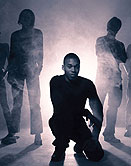Newer Drugs No Better Than Older Ones for Childhood Schizophrenia
Side effects differ, but most patients find little relief in long run, experts say.
By Steven Reinberg
HealthDay Reporter
|
E-mail this article
Subscribe to news
Printer friendly version
|

(SOURCES: Linmarie Sikich, M.D., assistant professor, psychiatry, University of North Carolina at Chapel Hill; Thomas R. Insel, M.D., director, National Institute of Mental Health; Sept. 15, 2008, The American Journal of Psychiatry, online)
MONDAY, Sept. 15 (HealthDay News) -- Newer antipsychotic medications are no better at relieving symptoms of schizophrenia in children and adolescents than older antipsychotic medications are, a new study finds.
The assumption has been that the newer drugs are safer and more effective; however, earlier trials found they are no more effective than the first-generation drugs, and they have different side effects than the older drugs, said Dr. Thomas R. Insel, director of the National Institute of Mental Health, which funded the study.
"This new trial looks at children where these new antipsychotics have been more widely used in the last five to eight years. The question was: Are these new drugs a better choice for children?" Insel said.
In the trial, researchers did not find any significant difference between older and newer antipsychotics, except for the side effects.
"All three of the antipsychotics we tested seemed to significantly reduce symptoms of schizophrenia in children and adolescents," said study author Dr. Linmarie Sikich, an assistant professor of psychiatry at the University of North Carolina at Chapel Hill. "But they have very different side effects. And none of them look any better than the others in terms of how much they reduce symptoms or how quickly they reduce symptoms."
Current guidelines for treating early-onset schizophrenia recommend using the newer drugs first, Sikich said.
"We think this study says you should seriously consider using the older drug first," she said. "Physicians really need to make an individual decision based on what side effects are likely to be most concerning -- what is problematic for their particular patient. Many people are going to have to try a few drugs to find which is best for them."
In addition, Sikich noted there was no difference between the older and newer drugs in how long people continue to take them.
The report was published in the Sept. 15 online edition of The American Journal of Psychiatry.
For the study, Sikich's team randomly assigned 116 children and adolescents aged 8 to 19 to receive the older antipsychotic molindone or the second-generation antipsychotics olanzapine or risperidone. The trial went on for eight weeks.
During that time, all the medications showed a similar decline in symptoms. However, the drugs cause different side effects. Patients taking olanzapine or risperidone experienced significant weight gain, while 40 percent of the patients taking molindone became restless.
"Olanzapine caused, on average, about 17 pounds of weight gain in eight weeks and rispiridone caused about 12 pounds of weight gain in eight weeks," Sikich said. "Whereas molindone actually caused a very slight weight loss."
Weight gain is a concern, because it is associated with higher risk of diabetes and heart disease and stroke, Sikich said. "With olanzapine, there was an increase in levels of bad cholesterol and an increase in insulin and indications of fat deposits in the liver, which can cause dysfunction, if it persists," she said. "Olanzapine shouldn't be the very first choice."
As a matter of fact, the olanzapine arm of the trial was ended early because of these troubling metabolic effects, according to the researchers.
Patients taking the older drug molindone also had to take another drug called benztropine to reduce muscle cramps and stiffness. Older antipsychotics, such as molindone, can produce Parkinson-like symptoms, such as involuntary movements, which in some patients can lead to permanent physical disabilities.
Beyond the differences between the medications, none of them really work very well, Sikich said. "The kids in the study didn't have a good enough response or had too many side effects to stay on the first medicine they were on."
After the initial eight weeks, Sikich's group followed the participants for a year. "By the time we got to a year, only 10 to 20 percent of the kids were able to stay on the medicine a whole year. Whereas we believe this illness is likely to need lifetime treatments. We clearly need better drugs that both work better and, even more importantly, have fewer side effects," she said.
Insel agreed the response to these medications isn't "all that great."
"These are kids who are pretty ill," Insel said. "It reminds us again that the medications we have may be necessary but not sufficient. We need to do much better both with psychosocial treatments as well coming up with a third-generation of medications that are just far more effective."
Until that time, Insel thinks that doctors should make prescribing decisions based upon which medication, old or new, is best for an individual patient. Although the older drugs are generally cheaper, cost should not be a criteria used when prescribing, Insel insisted.
"These findings ought to be used to open up choice, not to restrict it," Insel said. "We don't want to make things totally about cost."
More information
For more on schizophrenia, visit the National Institute of Mental Health.
Copyright © 2008 ScoutNews, LLC. All rights reserved. 
HealthDayNews articles are derived from various sources and do not reflect federal policy. healthfinder.gov does not endorse opinions, products, or services that may appear in news stories. For more information on health topics in the news, visit the healthfinder.gov health library.